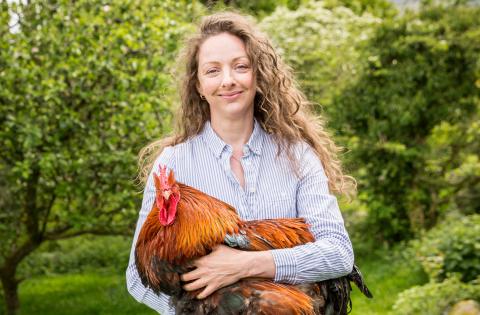Bangor University graduate Emma Duffy earned a first-class degree in Biology with Biochemistry. She is an accomplished equine specialist, a fruit and vegetable supplier and now a commercial poultry keeper. The Covid lockdown meant she could not offer private tuition in classical dressage at the small riding school at her family’s 13 acre smallholding near Caernarfon. To compensate, Emma expanded her ‘poultry hobby’ into a new business venture selling both eggs and pullets, which works alongside ‘Village Veg’, the successful fruit and vegetable delivery business started in 2009.
“I plan to visit specialty poultry breeders and in-ovo technology businesses in the Netherlands, Germany and the UK to learn how to apply commercially used poultry-sexing techniques for the preservation of rare breeds.”
Executive Summary
In ovo gender technology could help economics of pure-breed pullet breeding
A breeder of pure-bred poultry is embarking on research that could help other small-scale producers to sex chickens while they are still in the egg.
Bangor University graduate Emma Duffy has studied chicken gender determination with support from the Farming Connect Management Exchange Programme and was so inspired that she is embarking on a master’s degree in BioInnovation at Aberystwyth University.
During her studies she hopes to develop a commercially available system for sexing a chicken in ovo - whilst it is still in the egg - to help small scale breeders to produce pure breed birds more economically and to improve animal welfare.
In commercial systems with hybrid layers, females can be selected as day old chicks as they can be identified by their down colour or wing feather growth.
In contrast, most pure bred chickens cannot be sexed until much later in the rearing process, says Emma, who lives in Caernarfon.
“If you are breeding and marketing pure breeds for egg layers, the males become a big problem both economically and ethically,’’ she says.
“With some breeds, it can be as late as 12 weeks before males can be identified by development of their secondary sex characteristic , such as comb growth and saddle feather development. That is a lot of feed, space, time and energy gone to waste as there is a very limited market for cockerels.’’
But moves are afoot in Europe to ban male chick culling.
Legislation came into force in Germany in 2022 and that has meant viable alternatives have had to be implemented by the egg industry in that country.
“Germany’s Federal Administrative Court ruled that in 2019 that animal welfare concerns outweigh the economic interest of farmers who wish to practise chick shredding - a method used to eliminate male chicks - and deemed culling unethical,’’ says Emma.
“Other European countries are also following Germany's decision to make chick culling unethical and therefore illegal.’’
Three in ovo gender selection processes have been independently developed as solutions - Seleggt, PLANTegg and In Ovo (ELLA).
These machines, capable of sexing a chicken while it is still in the egg, could be installed in UK hatcheries if legislation banning the culling of male chicks comes into force.
But this technology is too expensive to be used on a small scale.
After studying these systems during her Farming Connect research, Emma believes the technology could be adapted to a smaller scale and be utilised for the production of female-only pure breed chicks.
One important fact she learned during her Management Exchange Programme study is that British pure breed poultry are also threatened by the number of coloured hybrids that are imported into the UK for the domestic market.
Over 52,000 Dominant CZ chicks and pullets are imported and sold to small holders and domestic keepers.
Similarly, an unknown number of pure breed chicks are imported from France to UK poultry wholesalers.
“In ovo sexing technology theoretically could be adapted and utilised to produce female pure breed pullets in the UK,’’ says Emma.
Pure breeds such as the Sussex could then become economically, environmentally, and ethically sustainable, she adds.
This would be a much more attractive option for poultry breeders, rearers, retailers and farmers who are interested in tradition, conservation and a niche product, Emma believes.
MANAGEMENT EXCHANGE REPORT


